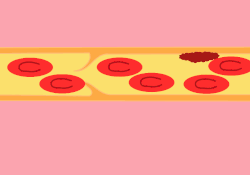Thrombus
A thrombus, or blood clot stops bleeding. It keeps blood inside a damaged blood vessel, and stops the hemorrhage.
| Thrombus | |
|---|---|
| Other names | Blood clot |
 | |
| Diagram of a thrombus (blood clot) that has blocked a blood vessel valve | |
A blood clot is the final product of the coagulation. There are aggregated platelets and red blood cells. Together with fibrin they form a plug, and stop the bleeding.
The substance making up a thrombus is sometimes called cruor.
A thrombus is a healthy response to injury to prevent bleeding, but can be harmful in thrombosis, when clots block blood flow through otherwise normal blood vessels.[1][2]
Thrombus Media
Animation of the formation of an occlusive thrombus in a vein. A few platelets attach themselves to the valve lips, constricting the opening and causing more platelets and red blood cells to aggregate and coagulate. Coagulation of unmoving blood on both sides of the blockage may propagate a clot in both directions.
Micrograph showing a thrombus (center of image) within a blood vessel of the placenta. H&E stain.
Composition of a fresh thrombus at microscopy, showing nuclear debris in a background of fibrin and red blood cells.
References
- ↑ Kumar, Vinay; Abbas, Abul; Aster, Jon (2014). Robbins & Cotran Pathologic Basis of Disease (9th ed.). Philadelphia, PA: Elsevier. ISBN 9781455726134. OCLC 879416939.
- ↑ "Venous thromboembolism (VTE) | McMaster Pathophysiology Review". www.pathophys.org. Archived from the original on 2018-11-03. Retrieved 2018-11-03.





